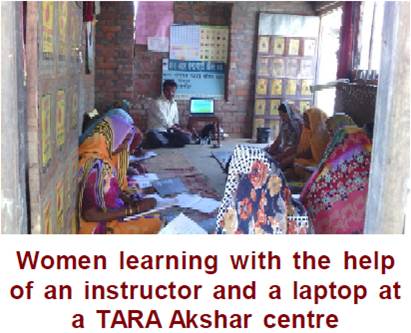|
New Inclusive Model of TARA Akshar+ programme
T ARA Akshar+ is an ICT based innovative programme to make illiterate women functionally literate. Though the programme has its own USP (in terms of memory hook techniques, flexible timing, short duration of time and service available at the door step to attract learners), deeper probing on the results and related qualitative aspects have pointed towards some gaps. These gaps are primarily related to women’s participation and their retention graph.Field research based on formal and informal interviews with the target population as well as the village communities have revealed that women and their families do not see any ‘tangible’ and ‘short term’ benefits arising from this association relating to the value of literacy in their day to day life and in providing better livelihood options or enhancing their incomes. To make this programme successful, it becomes
essential to involve not only the women but the entire community and to
show them the value of this engagement so that they start taking
ownership. Towards fulfilling this aim, an inclusive strategy of
engagement has been chalked out, which includes the following aspects: · Extended duration: Integrating additional sessions of reading practice as ‘Apni Pathshala’ (AP) in the TARA Akshar+ programme, where AP runs as an ‘activity centre’ rather than just as a reading club and it emerges as a Continuous Learning Centre (CLC) after the programme ends. Though the learning component of the TARA Akshar+ programme is for just two months but the AP component is for another six months. The AP centres are not only for the TARA Akshar+ learners but for all women who are semi-literate or illiterate in the community. TARA Sahelis will facilitate the self-learning process by showing films, skits, sharing the reading materials and having discussion rounds.· Apni Pathshala developed as an activity centre: APs will be developed as a platform where stakeholders such as Panchayats, Civil Society Organisations, Jan Shikshan Sansthans, Aanganwadis, will take the lead by utilising this centre as an interactive platform for fulfilling their mandate of reaching out to communities.· Motivational two minute clippings: In the ongoing TARA Akshar+ programme, the women will be motivated by regular viewing of inspirational movies, songs and actual real life motivational clippings. This will help them see the big long term picture about how this programme is enhancing the qualitative aspects of the learners’ lives.· Ownership: This programme cannot be done without due engagement of the entire village community as people in the village have to take ownership for ensuring that the women attend classes regularly and to bring inputs that the AP remains an activity hub which has space, engagement opportunities and so on.This new engagement strategy calls for a clear communication strategy without which it would be impossible to bring different stakeholders on board. For example in this new inclusive model, messages for the village communities will focus on: · Women’s literacy is a step to progress and development of the entire village.· This literacy programme is a building block to development.· Strength of this building block lies in the extent of ownership taken by the community towards running of this programme.· Apni Pathshalas emerging as Continuous Learning Centres is an indicator that the village is responsive and is ready to become the ground of new development initiatives.Similarly there are communication messages being framed for different stakeholders such as the CSO partners, PRIs, Block Development Officers, school authorities, education department officials, Aanganwadi and health officials. Realising the importance of the delivery process, intensive efforts are being undertaken to bring the internal stakeholders like the trainers, instructors and supervisors on board. The entire training design is being reworked to make it more interactive and goal oriented. Though this new strategy involves a lot of ‘high touch’ from the programme personnel (mainly in the initial stages of the programme) but it also ensures programme outcomes (positive changes in the lives of women) and sustainability in the long run. q Alka Srivastava
|
